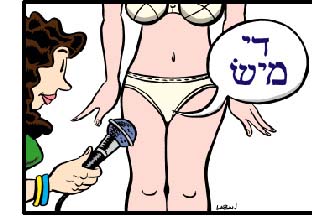

|

|

|

|
| |
|
|
|
"Shulamis," the teacher says, as I knew she would, "vos hert zikh?" Shulamis is my Yiddish name and the Yiddish teacher is asking what's being heard, meaning, "What's doing?" The class nearly always begins this way, round-robin, like group therapy, like consciousness-raising. It's all female, it so happens, though men have come and gone, mostly gone. Over the years of weeks, we've learned of tsuris--trouble--with contractors, computer repairmen, auto mechanics and adult children; births, deaths and illness; weddings and bar mitzvahs attended; cruises and other travels; and often, of current movies and plays. Since I saw a performance Saturday night, I say just that, except that I say forshung instead of forshtellung, which means I attended a research, rather than a play. Once that's cleared up, the teacher asks, "And what was it called?" I improvise: "Di Vagina Monologn." I'm in luck: double cognates. But because our teacher doesn't want us to rely on
The questions come at me thick and fast, in Yiddish and English: "About vaginas?" "What is there to say?" "You can't talk about everything. That's private." "Dos muterort," I say, "iz shtum," using the only word I can think of for "silent." I'm thinking of one form of the letter alef, which is stum or "silent." "And the breasts," a classmate asks, "they speak?" "Yoh," I say. "Could I write a monologue about my nose?" "It wouldn't be very interesting." "The writer," I say, "interviewed many women." "About their vaginas?" "What did she ask them?" I approximate: "If your vagina could wear something, what would it wear?" "You mean underwear?" "Neyn," I say. It made so much sense inside the theater, Ensler with her perfect shiny bob of hair, listing the answers women gave her--taffeta dress, mink--though even then it was hard to imagine, because how can you dress a part of you that is a passageway? In that semi-darkness, it was easier to make the metaphorical leap. I wanted to say, "It's like asking, 'If you were a tree, what kind would you be?' " but the conditional is so difficult. The conversation veers away and back, during which the teacher tells us the word for "period" (pekl), and another student says that we've already learned it. But the rest of us are so forgetful that we deny learning anything until we've heard it 10 times. It's tricky to keep up with this wanted-dead-or-alive language, which few of us actually use outside each 90-minute session. The class meets in the chapel of an Orthodox synagogue in Chicago, though the class is sponsored by a nonsectarian Jewish adult-ed organization, not the synagogue. We used to meet in the library of a nearby worn-out building before it changed hands and became an Indian center. This chapel has a mekhitsa, the wall that separates men and women at prayer. We meet in the women's section, not because the group happens to be all-female, but because there's more space to move around. Here, where we have learned there is no Yiddish word for "brunch" but there is one for "e-mail" (blitz-post), we now learn the words damen-bandazh ("ladies-bandage," or sanitary napkin) and klole ("curse"), and discuss whether God's curse was menstruation or childbirth. After class, we walk down the synagogue hallway speaking (in English) about menstruation. Later at home I look up "vagina" in my modern Yiddish-English dictionary (copyright 1968, reprinted 1990) and find di vagina (hard g) and di mutersheyd. (I trust my teacher, though; she gives us the most current translations.) I look for "tampon" (not there), "vulva" (missing), clitoris (gone), feeling uneasily like an 11-year-old, looking up dirty words in the dictionary. Does this mean that the folks who claim that Yiddish is dead are right, that the mameloshen--"mother tongue"--is not a living language? "Orgasm" (cognate) is listed, because, I assume, men have them. Same with "masturbation" (der onanizm). "Penis" is a cognate, and its slang variations, shmuck and putz, are unlisted but quite at home in America. For a moment the bilingual dictionary makes me feel partially disappeared, my genitalia only half recognized. Later my teacher will tell me, via blitz-post, that there are about 40 entries for "vagina" in her Yiddish thesaurus, and that her all-time favorite is di mayse, "the story." But before I know this, while I am still contemplating my too-empty
dictionary, I think: For a few minutes, there we were--Orthodox
and Conservative and secular Jewish women, hair covered and wildly
uncovered--talking aloud and bilingually about vaginas as we sat
by ourselves behind the mekhitsa. S.L. Wisenberg's short story collection, The Sweetheart Is In, is forthcoming in April from TriQuarterly Books/Northwestern University Press.
|


